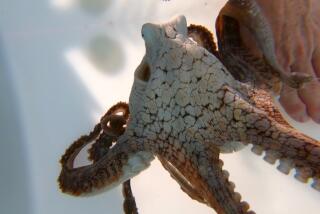Mexico Creates Fish Sanctuary : Environment: Salinas declares region of Gulf of California a reserve in effort to protect two threatened species, the totoaba and the vaquita dolphin.
- Share via
SAN DIEGO — Culminating a cross-border campaign to protect an endangered dolphin, Mexican President Carlos Salinas de Gortari on Thursday declared the creation of a marine life sanctuary in the northern Gulf of California.
Salinas made the announcement in Puerto Penasco, a fishing village in the state of Sonora, during a visit to northern Mexico. Described by Mexican and U.S. officials as a bold initiative, the 3,700-square mile “biosphere” reserve will encompass a triangular area off the eastern coast of the Baja California peninsula.
The sanctuary will “preserve the natural environment of the region and the most fragile ecosystems,” according to a presidential decree issued Thursday.
U.S. Interior Secretary Bruce Babbitt joined Salinas for the ceremony.
The northern gulf is home to two highly endangered species: the totoaba fish and the vaquita, the world’s smallest and most endangered dolphin, a shy mammal so rarely seen alive that fishermen call it a phantom.
Illegal fishing of the totoaba--which grows up to six feet long and weighs up to 300 pounds--in the increasingly popular tourist region has depleted both species. Vaquita are inadvertently caught in fishing nets, and marine biologists warn that the dolphin could become extinct in 10 years.
During the last year, Mexican authorities cracked down on totoaba fishing, and U.S. and Mexican officials discussed joint measures to preserve the gulf’s rich marine life and halt the smuggling of totoaba across the U.S. border.
The presidential decree represents a victory for Mexican and U.S. environmentalists, who for years have urged the Mexican government to shield the region’s wildlife from accelerating economic development. In 1991, Salinas signed a decree making it illegal to kill any marine mammal in Mexican waters and outlawing large-mesh totoaba nets last year.
“This is very significant,” said Christopher Croft of Defenders of Wildlife, a Washington-based organization at the forefront of the vaquita campaign. “We support it wholeheartedly. It will protect the very rich habitat of the northern gulf.”
The measure also represents the latest effort by the Salinas Administration to show progress on environmental reform, which is considered key to the passage of the proposed North American Free Trade Agreement.
Mexican officials say President Salinas endorsed the proposal “partly as a demonstration of Mexico’s commitment to the protection of the ecology at a time when the United States was seeking to negotiate stronger environmental standards in connection with NAFTA,” according to a communique from the U.S. Embassy in Mexico.
As recommended last month by a commission of Mexican academics, conservationists and federal and state officials, creation of the sanctuary imposes an outright ban on sport and commercial fishing and oil drilling in a “core zone” extending from San Felipe to the fishing village of Santa Clara, across the gulf in Sonora.
The remaining portion of the reserve will consist of a buffer zone in which fishing will be permitted only under strict government regulations, according to Mexican environmental officials.
Authorities plan to eliminate shrimp trawling in the buffer zone and limit the use of gill nets for catching sharks--two factors in the overall depletion of marine resources in the area, according to authorities and activists. Those regulations will be phased in over a three-year period.
Although technically illegal, the totoaba trade had flourished in towns such as San Felipe until recently, fed by demand from U.S. fishing enthusiasts and tourists. An informational campaign aimed at reducing that demand has featured actor and social activist Edward James Olmos, whose television public service announcements appealing for preservation of the totoaba and vaquita have been broadcast in the Southwest and in Mexico.
It is not yet clear what employment alternatives the Mexican government plans to provide for the fishing communities that will be affected. But the designers of the reserve have said that ensuring the economic well-being of the fishermen of the gulf will be central to the project’s success.
Fishing Ban
Mexican President Carlos Salinas de Gortari declared a 3,700-square mile sanctuary in the Gulf of California to protect the imperiled vaquita dolphin and totoaba fish. The sanctuary will form a rough triangle, with its corners at the mouth of the Colorado River, San Felipe and Puerto Penasco.
More to Read
Sign up for Essential California
The most important California stories and recommendations in your inbox every morning.
You may occasionally receive promotional content from the Los Angeles Times.










